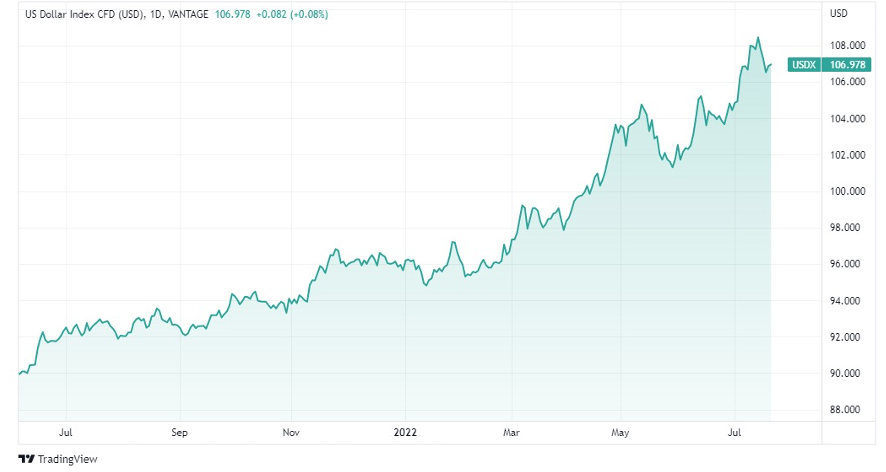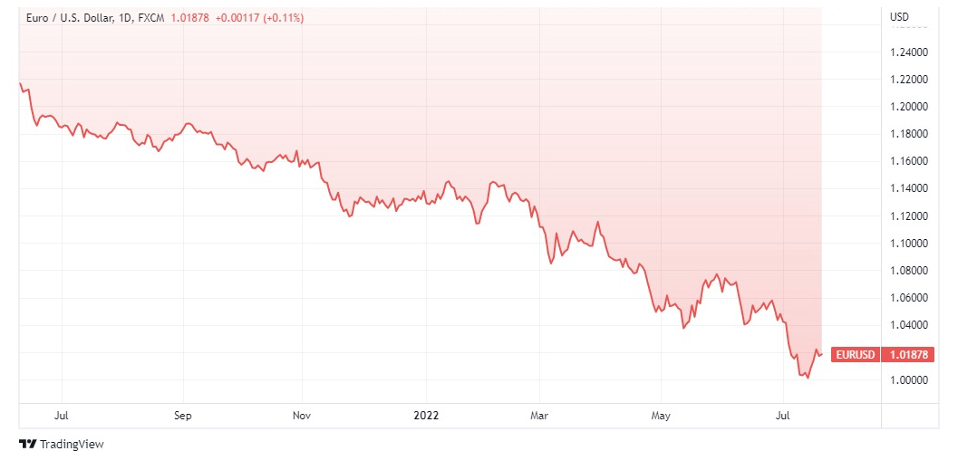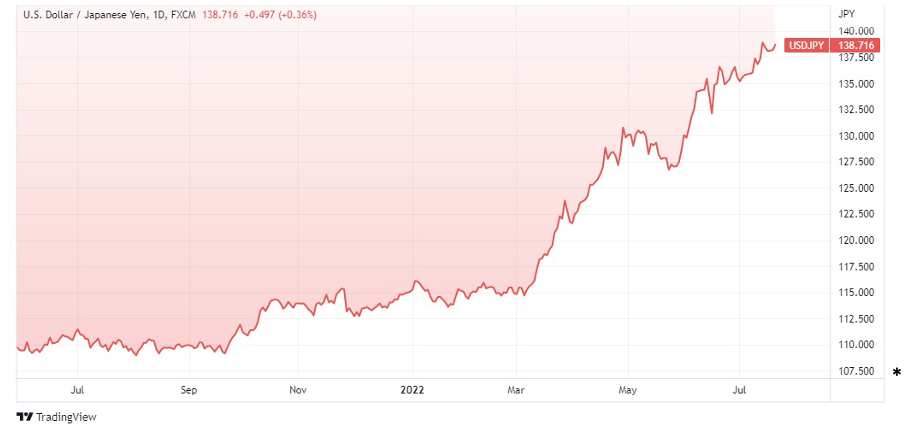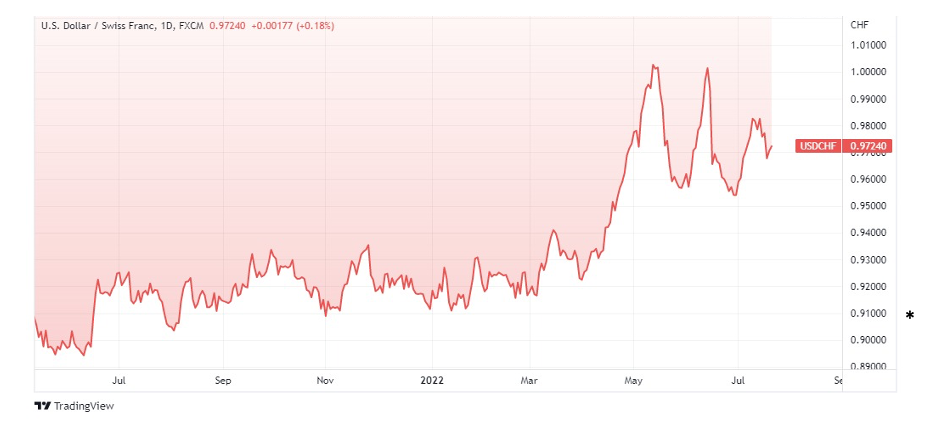Warning on risks: Financial contracts for difference are complex instruments and are associated with a high risk of rapid financial losses due to leverage. On 76.44% of retail investor accounts, financial losses occur when trading financial contracts for difference with this provider. You should consider whether you understand how financial contracts for difference work, and whether you can afford to take the high risk of suffering financial losses. Please read the Risk Disclosures.


War, Inflation, Recession. How are Major Currencies Performing in 2022?
Russia’s invasion of Ukraine prompted the US, UK and Europe to sanction resources flowing from Russia towards North American and Europe, among other financial & individual-focused measures. Namely, the importation & exportation of energy resources is being eyed and exercised, such as oil and natural gas, which added more fuel (or oil) to the fire of globally-constrained energy reserves. Winter is coming, and Europe desperately needs natural gas to stay warm. The continent remains highly dependent on Russian gas, with imports amounting to 40% of EU’s total gas consumption in 2021, climbing to 65% in Germany.
Long story short, in 2022, the world yet again became a victim of a calamitous recession, which only aggravated prevalent energy shortages, ensuing a surge in oil prices amid sky-high demand & limited supply. What happened after that? Inflation. Record-high inflation. Across many nations, vital products & services became much more expensive. The United States was mutilated by an annual inflation rate of 9.1% in June; the highest since November 1981. Europe was also hit very hard. Much harder than USA. Inflation toxified the EU in 2021, which was exacerbated in 2022 to hit 9.6% in June; a record high.
War led to inflation, hand-in-hand with growing concerns regarding macroeconomic instability, inflation led to a recession. Central banks of many economies, including the US, Canada, Switzerland, India, Singapore and Australia, have viciously hiked their interest rates to combat inflation. This led to dwindling demand to spend & invest, resulting in nation-wide recessions.
How are major currencies being impacted from all this?
The Rise of the Dollar

This year, USA’s dollar greenback soared to its highest level since February 2009. The USD, regarded as a benchmark in the foreign exchange market, has gone through the roof to 20-year highs against a basket of six major currencies, and that’s reflected on the dollar index.*
In the first quarter, household spending, job gains & business fixed investment remained robust, with unemployment rates declining significantly. Yet, supply & demand imbalances created by the pandemic, rocketing energy prices and nation-wide pricing pressures prompted the Federal Reserve to hike interest rates by 0.75% in May; the largest hike since 2000.
Another month, another hike. Despite solid job gains, mounting inflationary pressures boosted the value of the greenback, amid fresh COVID-19 restrictions in China. USA’s economic hardship had to be tamed once again, and the Fed boosted interest rates by 75 basis points in June instead of 50 basis points expected, marking the largest rate hike since 1994.
Euro’s Dying Flame

In 2022, the renowned euro deteriorated to levels unseen since 2002, arguably hit the hardest out of all currencies. Nosediving below the dollar for the first time in 20 years, the war in Ukraine pushed the common currency down. The euro was further-weakened amid growing fears that Russia may restrict more energy supplies to Europe, given current sanctions.*
In-turn, inflation was stoked. The European Central Bank (ECB) lagged in raising interest rates; it hasn’t increased the benchmark rate in 11 years. Yet, this changed on July 21st. Markets were startled when the ECB hiked rates by a larger-than-expected increment of 50 basis points. Investors expected a smaller hike of 25 points. Volatility occurred and the euro bumped higher.
Gains were capped, markets balanced out and the euro subsided. Recently, the ECB noted that it'll hike interest rates as much & frequent as necessary until the 2% inflation rate target is met.
Falling Yens

The fan-favorite Japanese yen collapsed this year. There’s no better way to say it. The world’s third-most-traded currency decayed to 24-year lows, given macroeconomic instability and soaring consumer prices. Mainly, it’s the Asian nation’s ultra-cool monetary policy which sharply contrasted the Federal Reserve’s aggressive character in stomping out inflation.
Bank of Japan (BOJ) has quite the loose monetary policy. Inflationary pressures were disregarded to some extent by Japan’s central bank, dashing any expectations of an alteration to policy. Instead of hiking rates like other major economies to cool down inflation, it doubled-down on its 10-year bonds.
What’s interesting about the yen is that it’s historically been regarded as a safe haven currency, but just like the Swiss franc and even gold, safe havens also took the blow this year. The yen’s decline was also driven by a substantial number of stop-loss orders triggered near the 135.6 mark, according to analysts.
Franc’s Unstable Stumble

An interesting debacle was that of the sanctuary Swiss franc. It has stumbled in 2022, but not as viciously as the Japanese yen nor the euro. Switzerland’s currency retained its value and stature as a safe haven currency, to some extent. To fight resurgent inflation, the Swiss National Bank (SNB) raised its policy interest rate for the first time since 2007 on June 16th.
The Swiss joined other major central banks in tightening monetary policy, driving its rate unexpectedly to -0.25% from -0.75% it implemented in 2015. Inflation in Switzerland was rampant, and the European nation had to step in. “We see at the moment that inflation has increased in Switzerland — we have close to 3% — and we also observed that we have a certain risk of second-round effects,” as stated by SNB Chairman Thomas Jordan to CNBC.
The Verdict
Major economies are recessionary, as the S&P 500 index declined over 20% till mid-June, but recovered 8% of its value in the following month.* Typically, recessions or bear markets last 6 to 11 months, while economic booms or bull markets last under 4 years on average.
Things may not recover too soon, though. Nomura’s head of global markets research Rob Subbaraman says, “Central banks, many of them have shifted to essentially a single mandate — and that’s to get inflation down. Monetary policy credibility is too precious an asset to lose. So they’re going to be very aggressive.”
“That means front loading rate hikes. We have been pointing for several months about the risks of a recession and we’ve bitten the bullet. And now we have many of the developed economies actually falling into recession”.
* Past performance is no guarantee of future results.